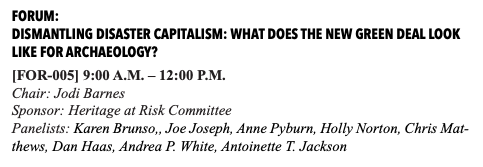Starting my #SHA2021 day with #FOR5, "Dismantling Disaster Capitalism: What Does the New Green Deal Look Like for Archaeology?"
Holly Norton starting with an explanation of Disaster Capitalism and its theoretical development by Naomi Klein and the Chicago School of Economics
Anne Pyburn posing the question... what do archaeologists think they're preserving, and who are they preserving it for? She suggests that we ought to prioritize preservation of human rights.
Much more in her 2014 article, "Preservation as ‘Disaster Capitalism’: The Downside of Site Rescue and the Complexity of Community Engagement" https://www.tandfonline.com/doi/abs/10.1179/1465518714Z.00000000070?journalCode=ypua20
Also -- a nice About the Book description of Naomi Klein's 2007 The Shock Doctrine: The Rise of Disaster Capitalism https://naomiklein.org/the-shock-doctrine/
Co-chair Jodi Barnes explaining the aha moment she had while reading The Shock Doctrine in 2020, experiencing a tornado in Arkansas, during COVID...
Dan Haas, a retired BLM archaeologist, joins our #histarch conversation to provide perspective from CRM and the federal govt.
See more of his work, "Education and Public Outreach in Federal Programs" here: https://www.nps.gov/crmjournal/CRM/v18n3.pdf
See more of his work, "Education and Public Outreach in Federal Programs" here: https://www.nps.gov/crmjournal/CRM/v18n3.pdf
Dan & Jodi have also cited Hutchings and La Salle 2015, "Archaeology as Disaster Capitalism," in which they describe the "clearance of Indigenous heritage from the landscape, making way for economic development" https://link.springer.com/article/10.1007/s10761-015-0308-3
Dan highlights the importance of incorporating Tribal consultation into the NHPA in 1992, spurring recognition of cultural and religious resources on public lands. However, recognition of intangible resources (e.g. viewshed, air quality) may be beyond developers' understanding..
Federal and developers' timelines can limit both public and engagement and Tribal consultation -- "capitalism at its best," says Dan.
Andrea White from the City of St. Augustine, provides a perspective from the city-level -- and discusses her previous experience responding to a disaster: Hurricane Katrina in New Orleans
Karen Brunso, the Tribal Historic Preservation Officer for the Chickasaw Nation, here to discuss her position "at the edge of the trowel" to figure out how regulations will actually play out.
Karen points out the lack of drills, planning & prep for historic preservation disasters; also lack of archaeological engagement with NEPA (which she argues has better teeth than NHPA)
Joe Joseph from @NewSouthAssoc here to talk about how we can navigate the bureaucratic process of responding to disasters.
Holly Norton, State Archaeologist @HistoryColorado, offers another perspective re: another type of disaster: wildfires. She highlights the importance of regular, systematic surveys of cultural features
Finally, Chris Matthews here to talk about the disaster of racism. (See also his recent book, A Struggle for Heritage: Archaeology and Civil Rights in a Long Island Community
https://upf.com/book.asp?id=9780813066684)
https://upf.com/book.asp?id=9780813066684)
Chris cites Robin Kelley's summary of Cedric Robinson's definition of racial capitalism, which centers the legacies of slavery and colonialism and the myth of capitalism as a great modernizer. More here: http://bostonreview.net/race/robin-d-g-kelley-what-did-cedric-robinson-mean-racial-capitalism
Chris asks, how can we better recognize and document the racial inequities of today as historically significant?
In the chat, Sarah Surface-Evans plugs her co-edited volume Blurring Timescapes, Subverting Erasure:
Remembering Ghosts on the Margins of History https://berghahnbooks.com/title/Surface-EvansBlurring
Remembering Ghosts on the Margins of History https://berghahnbooks.com/title/Surface-EvansBlurring
After a break (yay) we are shifting slightly to focus on the Green New Deal by @aoc and @EdMarkey -- specifically the role of archaeology in the plan to address climate change, end disaster capitalism, and achieve social justice!
Andrea White on sea level rise and community resiliency in St. Augustine -- importance of and challenges for the city archaeology program in preserving the material record from fluctuating water levels
Important point about connecting & working with other officials & non-archaeologists to ensure involvement early on in planning processes!
Another great point about how the archaeological resource we have the most control over is the collection we've previously excavated! Keep budgets and resources available to protect those collections.
Marcy Rockman making a quick cameo appearance on this panel :) to tell us about her work telling stories and identifying themes related to climate change.
Read "Every place has a climate story" https://drive.google.com/drive/u/0/folders/1yIRTbo7Beyo4Bgk3N2anc2PJ1mP2yvwo
Read "Every place has a climate story" https://drive.google.com/drive/u/0/folders/1yIRTbo7Beyo4Bgk3N2anc2PJ1mP2yvwo
Holly echoing Joe's earlier comments about strengthening and supporting Section 110, which asks all federal agencies to establish programs to identify, evaluate, and protect historic properties
Jodi asked Dan to speak on how the Green New Deal might affect federal compliance work in the future. Dan mentions importance of up-to-date digital databases in advance of large planning efforts.
Karen agrees that we need funds to hire staff to keep our legacy collections and data organized, and echos Dan that connecting with environmental professionals is important.
Another important tip from Karen that will make environmental people happy: add data to fieldwork forms about the natural landscape, e.g. plant life. This may also be significant to Tribal authorities (even if they can't share sensitive information about medicinal uses).
Anne warns against thinking of capitalism as a monolith, which would make it unassailable. It has a complex, deep history.
Chris reflecting on how histories and cities have been racialized (e.g. Flint Michigan) and people written off as participants in the capitalist system. How can we as archaeologists recognize the humanity in all the work we do?
Last words on addressing climate change:
•join the SHA Heritage at Risk committee! https://docs.google.com/forms/d/1U0HqlxAcAxf5SBCmy8S5YC0GY4yvjwF4y08R7t7jHKg/viewform?edit_requested=true
•advocate
•remember who you're talking to
•reinvent archaeology so we are working FOR communities
•justice
•be interdisciplinary
•join the SHA Heritage at Risk committee! https://docs.google.com/forms/d/1U0HqlxAcAxf5SBCmy8S5YC0GY4yvjwF4y08R7t7jHKg/viewform?edit_requested=true
•advocate
•remember who you're talking to
•reinvent archaeology so we are working FOR communities
•justice
•be interdisciplinary

 Read on Twitter
Read on Twitter


